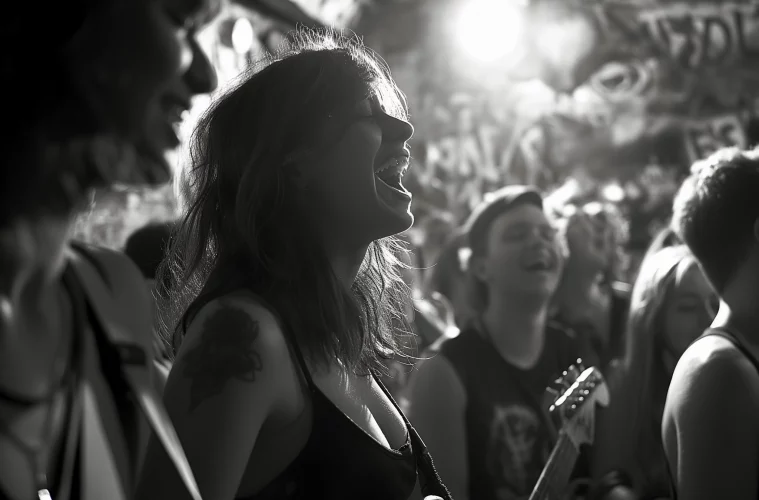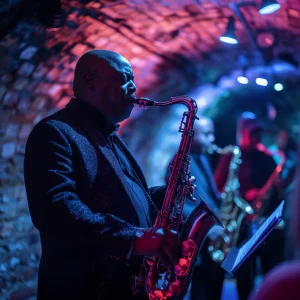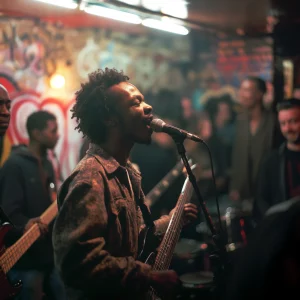London’s Underground Music Landscape
London is a bastion of cultural diversity and influence, a true hub where artistic expressions flourish. The city’s music scene is particularly noteworthy, renowned for its eclectic nature and capacity to shape and propel the careers of numerous artists. Here, genres blend, and innovations arise, making London a pivotal point on the global music map. From the rise of punk rock in the 1970s to the contemporary beats of grime and techno, London’s musical heritage is as varied as it is influential.
Underground music venues are critical in this vibrant landscape, often tucked away in the city’s myriad streets and alleys. These places are not just spaces for performance but are cultural sanctuaries where new sounds are birthed and honed. They serve as intimate gathering spots for communities of music lovers who prefer the raw and authentic atmosphere these venues provide over the polished ambience of mainstream clubs and concert halls.
The Pulse of Underground Venues
The allure of London’s underground music venues lies in their unique combination of intimacy, exclusivity, and rich cultural tapestry. Often hidden from the casual observer, these venues offer transformative nights filled with outstanding musical performances. They range from small, cosy spots suitable for acoustic solo acts to slightly larger venues that accommodate electronic dance music’s pulsating energy. Each venue carries its distinct charm and contributes significantly to the city’s reputation as a cradle of musical innovation.
Notable Underground Hotspots
- Corsica Studios: Nestled in the heart of Elephant and Castle, known for its gritty electronic beats and avant-garde performances.
- The Underworld: Located in Camden, this venue is synonymous with rock and heavy metal, hosting both burgeoning bands and established acts.
- Phonox is a Brixton favourite. It offers a seamless mix of DJ-led nights and is particularly noted for its vibrant weekend scenes.
- Village Underground: Situated in Shoreditch, it is a creative arts space revered for its eclectic music nights.
- FOLD: Found in Canning Town, this club is celebrated for its relentless techno nights that continue well into the morning.
- The Windmill: A Brixton locale that is as quirky as it is endearing, known for supporting indie artists and alternative rock bands.
- Ronnie Scott’s is an iconic jazz club in Soho that has hosted some of the most famous jazz names since its inception.
- Electrowerkz: Located near Angel, this venue is a haven for lovers of industrial and electronic music, known for its raw, unpolished aesthetic.
These venues are strategically located across various London neighbourhoods, from the bustling streets of Waterloo and Mayfair to the trendy enclaves of Shoreditch and the historical backdrop of Soho. Each location contributes a different flavour to the music, influenced by the local culture, audience, and history.
A Melting Pot of Genres
The music played in these underground venues cuts across a wide range of genres, reflecting the diversity of London’s population and its musical tastes. On any night, one can experience the hard-hitting beats of techno and jungle or the smooth rhythms of jazz and soul. Other popular genres include:
- Techno and House: Dominating clubs like FOLD and Corsica Studios, these genres cater to dance music enthusiasts.
- Jungle and Bass Music: With its breakbeat rhythms and heavy bass, jungle music thrives in venues favouring raw, energetic vibes.
- Cloudcore and Electropop: These newer genres, featuring dreamy vocals over synthesised beats, are becoming increasingly popular in the more avant-garde spaces.
- Jazz and Blues: Timeless and ever-evolving, jazz finds its home in venues like Ronnie Scott’s, where its rich history is preserved and celebrated.
- Rock and Metal: The raw energy remains a staple in venues like The Underworld, where loud, live music reigns supreme.
Venue Characteristics and Atmosphere
Each of London’s underground music venues has distinctive features that enhance the musical experience and embed it in the hearts of its patrons. The physical characteristics of these venues often reflect the ethos and culture they promote, from low ceilings and dark rooms that create an intimate and intense atmosphere to industrial aesthetics that resonate with the raw energy of the music being performed.
Unique Architectural and Aesthetic Features
- Industrial and Minimalistic: Venues like FOLD and Electrowerkz leverage industrial aesthetics, featuring bare concrete and minimalistic decor that underscores the underground vibe.
- Victorian and Historical: Some venues, like Village Underground, are housed in repurposed structures, including Victorian warehouses and disused railway arches, adding a historical charm and a unique narrative to the music experience.
- Artistic Spaces: Venues such as The Windmill and Village Underground often double as art galleries or performance spaces, showcasing rooftop installations or contemporary art, which aligns with their audiences’ creative spirit.
The state-of-the-art sound systems installed in these venues are crucial to delivering the high-quality sound that underground music fans expect. Superior acoustics allow for a more immersive experience, whether the night features a live band, a DJ, or a cabaret show. Carefully curating sound technology ensures that everyone in the room hears and feels each performance.
Events and Community Engagement
The range of events these underground venues host is as diverse as the genres they promote. The calendar is packed with variety, from live bands playing indie or rock to DJ nights pulsing with techno and house. Themed nights, cabaret shows, and special performances also make frequent appearances, offering something unique for every taste and preference.
Community and Culture
Underground venues are not just places to listen to music but cultural hubs that foster community engagement and support. Many are known for being queer-friendly and providing safe spaces for alternative lifestyles, reflecting London’s inclusive and diverse ethos. These venues are essential platforms for emerging artists and are instrumental in developing local music scenes. They are cherished for the entertainment they provide and the support and community they foster.
Events often go beyond music, incorporating aspects of local culture, art, and performance, which helps knit tight-knit communities. These gatherings are more than just nights out; they are pivotal experiences that help shape the cultural identity of attendees and the city itself.
Personal Experiences and Testimonials
Delving into the personal stories of those who frequent London’s underground music venues provides a vivid tableau of their impact on individuals and the broader community. These anecdotes underscore the venues’ roles as more than just entertainment spaces; they are crucibles of creative expression and camaraderie.
Patrons of these venues often speak of their first encounters with the underground music scene as pivotal moments. Many recount walking into a venue for the first time and feeling an overwhelming sense of belonging, surrounded by others who share their passion for music that is not found on the mainstream charts. For artists, these spaces are sacred grounds where they can experiment and hone their craft without the pressure of commercial success.
“One night at Corsica Studios changed the trajectory of my music career,” shared an emerging techno DJ. “The crowd’s energy, the acoustics, the acceptance—it all drove me to push my limits and evolve my style.”
Impact on Emerging Talent
Underground venues are pivotal for emerging talent, offering a platform where new artists can perform, often for the first time, to an audience that is supportive and encouraging. This is crucial in a city as competitive as London, where breaking into the music scene can be daunting.
A jazz musician recounted their regular gigs at Ronnie Scott’s: “Playing there wasn’t just about exposure. It was a masterclass in performance, watching and learning from some of the best musicians. That stage is a rite of passage for any jazz artist in the city.”
A Vital Part of London’s Nightlife
London’s underground music venues are indispensable to the city’s cultural identity. They are not merely places to hear music but essential elements of London’s cultural, social, and economic fabric. By supporting these venues, we preserve a critical aspect of the city’s nightlife and ensure that London remains at the forefront of global cultural innovation.
In exploring underground music venues, we have seen how they shape careers, create communities, and challenge artists and patrons to engage deeply with the arts. These venues represent the heart and soul of London’s music scene, and their continued vibrancy is essential for maintaining the city’s dynamic spirit.




